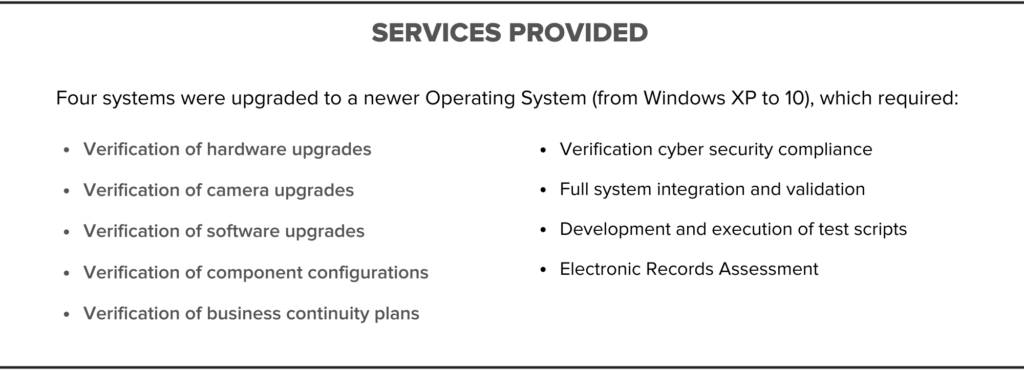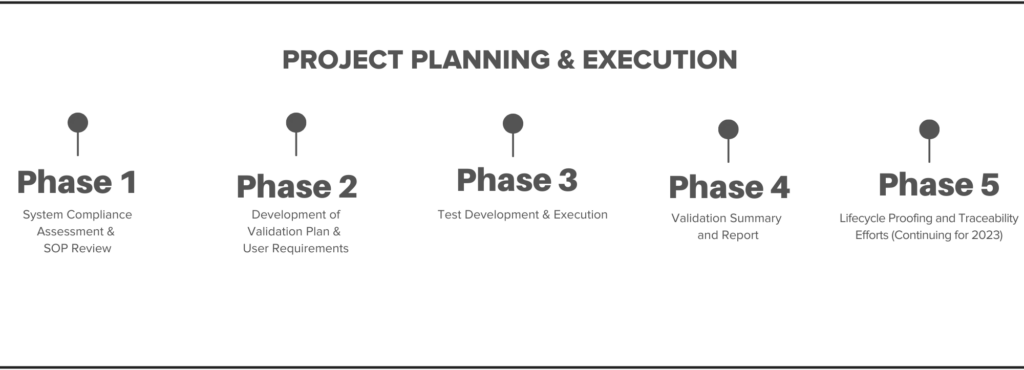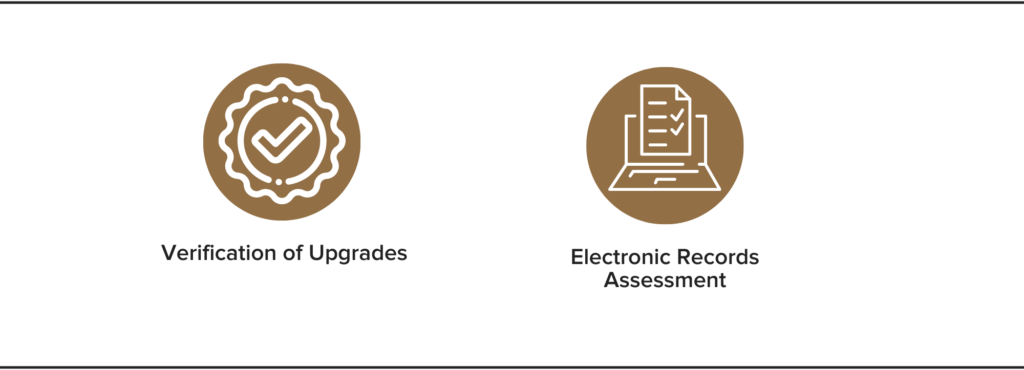At A Glance
Our team planned and executed the validation of a system update for a large pharmaceutical manufacturer’s pre-fill syringe Systech serialization systems. The client’s systems required updating from Microsoft Windows XP to Microsoft Windows 10, as well as upgrades to new cameras, other hardware, software, and data protection controls. All of this required multiple change controls to be created and managed in the client’s electronic quality system (eQMS) and computer system validation to qualify each system after the upgrade. A data server was also installed to align with the evolution of serialization and Performance Validation validated a new system to support the rework. The PV team was responsible for the full validation project from the initial assessment to the final approval report delivery.

EXPERIENCE, QUALITY AND SPEED CONTRIBUTE TO A COMPLETE QUALIFICATION
Since the client’s previous system did not have an existing automation documentation lifecycle, our PV team had to prioritize the quality and speed of our efforts to ensure the upgrades were finished during our client’s shutdown period. The eight systems were already categorized, but it required input from six departments to fully create the testing parameters so we could execute the tests correctly.
TRACEABILITY MATRIX CREATED TO ENSURE CHANGES WERE MADE IN A CONTROLLED AND TRACEABLE MANNER
PV created documentation to ensure the traceability of the product and to comply with regulatory requirements such as FDA CFR Parts 211, 210 and 11 (electronic records and signatures). The matrix enabled us to track and document any changes being made to the product, ensuring that any modifications were made in a controlled manner. Our team utilized a lifecycle approach throughout the development process to ensure that all stages of the project were fully documented and aligned with regulatory requirements.
This approach enabled us to identify and mitigate potential issues early in the development process, minimizing the risk of delays or compliance issues during implementation.

EXPERIENCE ALLOWS PV TO EXPEDITE THE PROCESS WITHOUT SACRIFICING QUALITY
Throughout Phase 2, we had physical meetings with the client’s teams to understand how the new software should work and what features they needed. We used this input to create the specification package, which avoided issues post-development in gaps between the Windows XP system and Windows 10 system.
Our team had previous experience executing Systech labeling system validation testing, so we could expedite the process without sacrificing any quality. Our SMEs were acting as the Project Manager for the whole project.
Due to the sensitive timeline, our team worked diligently to deliver a completed qualification on time allowing our client to start mass-filling their syringes with no further operational impacts.

DIVERSE EXPERIENCE ALLOWS PV TO STAY ON TRACK
In this project, our team did not have any challenges fulfilling our promises or executing the project. The biggest challenge revolved around a scope change in the middle of Phase 2, which required our SMEs to shift responsibilities to support the change control. Due to PV’s well-rounded and experienced team, the changes were met, and the project was still delivered under budget and on time.
CLIENT REQUESTS ADDITIONAL WORK TO BE COMPLETED FOR MANDATED AGGREGATION
In addition, Performance Validation was requested to manage the federally mandated aggregation early in 2023. This mandate will ensure products can be traced back to a parent container or a higher-level packaging unit. This allows for better tracking and traceability of the pre-filled syringes throughout the supply chain and will aid in the recall process, as it allows for a more precise identification of affected products.
